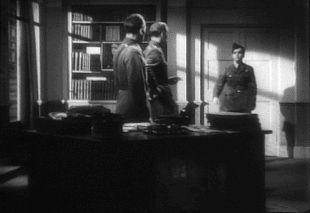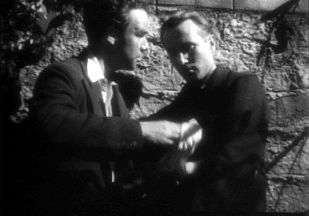
     by Dr. Kenneth Rivers -- page 3 of 4 by Dr. Kenneth Rivers -- page 3 of 4 |

A sergeant tells two officers about his escape from a German POW camp in Bon Voyage.
(© 1993 British Film Institute. All rights reserved.) |
Bon Voyage
Hitchcock's second WWII propaganda film, Bon Voyage, is superior entertainment, but it's even more problematic as propaganda than Aventure malgache. The script, based on a short story by Arthur Calder Marshall, was penned by Hitchcock and Scottish scenarist Angus McPhail (Wood 55). It begins with a Scottish Royal Air Force sergeant, John Dougall, telling two French officers about his amazing escape from a German POW camp and his journey to safety in the French city of Reims (the traditional coronation site of French kings and thus a symbol of French sovereignty.) Once again, we see the principle story told in flashback. Helped by an Allied agent named Stefan Godowski, Dougall has one close call after another. They make their way from one town to another thanks to the assistance of a string of brave Resistance fighters. Along the way, they dispose of a Vichy spy, outwit German agents, and finally arrive at an airstrip where a plane awaits. But there is only one seat available. Godowski loses a roll of the dice, so Dougall gets the seat. He flies into free territory and completes his extraordinary escape, even helping to deliver some papers from Godowski to Resistance patriots along the way. Dougall commends the clockwork precision of the mission, "bien réglé", as he puts it, perfectly executed.
When he finishes his narration, Dougall's French interrogator informs him that his version is not quite accurate. The interrogator retells the entire story, which we once more see in flashback. The officer explains to Dougall, and to us, that Godowski was not an Allied agent but actually a Gestapo spy. The escape was engineered by the Germans so that Dougall would unwittingly help them learn the identities and locations of all the Resistance heroes who provided assistance along the way. After Dougall proceeded on his way to freedom, Godowski lured the Resistance fighters into traps--resulting in their deaths. Even the papers that Dougall delivered were Nazi spy messages passed along by Godowski--who intentionally lost the dice roll before putting Dougall on the plane. Dougall, upon hearing the truth, sits stunned, incredulous at the thought of his own unintentional collaboration with the enemy. The French officer assumes that Dougall is simply hurting over the death of a lady Resistance fighter who Dougall had fallen in love with. The officer suggests the building of a new tomb under the Arc de Triomphe to go along with the Tomb of the Unknown Soldier, a new "Tomb of the Unknown Civilian." Dougall stares into space. The End. We all react like Dougall, struck dumb by a vintage Hitchcock surprise twist ending.

During their escape, Allied agent Stefan Godowski wraps John Dougall's injured hand in Bon Voyage.
(© 1993 British Film Institute. All rights reserved.) |
While conveying one of the typical wartime messages--"loose lips sink ships"--the script suggests how easily one might get duped into collaboration with the enemy if one is not vigilant about such treacheries. However, the script goes so far beyond that theme that its practical utility is reduced to virtually zero. What Hitchcock has given us is an amazing exercise in cosmic irony. The whole universe is playing some sort of diabolical trick on the poor Scottish sergeant. In this story, almost no one is who or what he seems. Every action, every occurrence, turns out to be the very opposite of what it appears. How can Dougall even be sure that the French officer is telling him the truth at the end or that he is really a French officer at all? And how could Dougall have avoided collaborating with the Germans if he had absolutely no way of knowing who was who or what was what? He ends up stunned and confused, incapable of discerning truth or reality. And there is no propaganda value in that. If you cannot tell the good from the bad, or discern the true from the false, then no propaganda message is possible. Hitchcock gives us a powerful jolt, but the intended moral of the story is undermined. In addition, the apparent gullibility of the RAF sergeant would not have endeared this tale to its British sponsors. This is, in fact, one more example of what Jane Sloan calls Hitchcock's "appealing knack for and glee in offending the powers that be" (8).
page 3 of 4
 
|